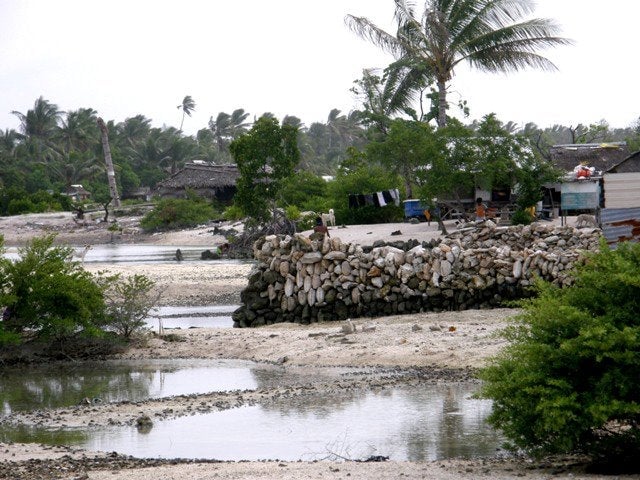IN 2008, 1500 residents of Carteret Islands, a group of atolls of the Autonomous Region of Bougainville in Papua New Guinea (PNG), had to be relocated becoming the world's first community to be displaced by rising sea level.
At the time, sea levels around the atoll had risen by 10 centimetres in the preceding 20 years which meant plantations were of no value as root crops both became salinated and would rot from inundation. The PNG government responded to the Carteret issue by allocating about $US700,000 ($F1.23m) in 2007 to a relocation program.

Now numbering 1700 people, the Carteret experience emphasised the fact that the relocation schemes are comprehensive than merely providing a home and some land for one is depriving a people the environment their very existence is inextricably linked to.
Climate change, in a recently-released United Nations report, is attributed to the world's consumption-based economic growth model which may have rescued millions of people from a lifetime of poverty, but has taken its toll on the environment; trends captured in the ICPD Global Review Report also affirm that larger populations do not necessarily translate to greater greenhouse-gas emissions.
The report says only 2.5 billion people of the world's 7.2 billion people have consumption profiles which result in greenhouse-gas emissions that are large enough to contribute to climate change.
It is therefore not so much the number of people on the planet but rather their consumption patterns and levels and the technology used which determines the impact on the environment; per capita greenhouse emissions are highest in rich countries.
The International Conference on Population and Development (ICPD) global review report is 179 governments' frank assessment of their performance in the implementation of the Program of Action (PoA) of the ICPD in Cairo (Egypt) in 1994. It was produced at the request of the General Assembly by the ICPD+20 Secretariat, housed in the United Nations Population Fund (UNFPA) headquarters.
The changing weather patterns, disastrous floods for example where never before experienced, is just one manifestations of how humanity has managed to forever alter the balance required for the planet's biodiversity to support its life-supporting systems.
Our dominant economic models largely ignored the interconnectedness of the planet and how massive industrialisation in Europe would cause a chain of events in nature that would lead to the relocation of island communities in the Pacific, only a few decades later, because of rising sea levels.
Climate change has evolved into a topic so ingrained into the global discourse today that people have, perhaps unfortunately, seemingly become immune to its forward-looking narrative around sustainability and/or innovation - this nonchalance could also stem from the vigorous opposition by climate change skeptics who claim it is a hoax.

However last month, the Inter-governmental Panel on Climate Change (IPCC) issued a report which affirmed that climate change is now occurring on all continents, across the oceans and that the world, in many cases, are ill-prepared for the associated risks; the absence of skeptics this time is glaring.
The report finds that risk from a changing climate comes from vulnerability or our lack of preparedness, exposure of people or assets in harm's way and hazards which trigger climate events or trends.
For vulnerable groups access to family planning and reproductive health services will be vital; reproductive health services for example the accessibility to family planning options by couples or women and (adolescent) girls alone may not equip the vulnerable groups with resilience or lead them out of poverty, but without such services the chances are they will remain vulnerable.
A 2011 report prepared by the UNFPA Indonesia office suggests that improving reproductive health and accessibility to reproductive health services contributes to climate change adaptation because the fundamental health of the individual prevents them from new health risks brought about by climate change. The good reproductive health of parents, particularly mothers, the report says, "has many flow-on effects for family welfare and the wellbeing of the next generation". It is a given that healthy people will also be able to better cope with the non-health-related problems brought about by climate change.
Countries which are considered major contributors to greenhouse gases because of their high levels of consumption have either low or below replacement fertility levels - replacement level is the assumption that a woman will have a daughter who will in turn have one and so forth. High fertility countries tend to be mired in poverty and have very low levels of consumption.
This trend however will change as countries with low consumption levels develop and allow more of their population to have the ability to consume more. The UNFPA has always acknowledged that countries and their populations have the right to development and to improve their living standards.
"Unless the anticipated consumption level increase happens in a radically different manner, unless we fundamentally shift the way we do business, our consumption levels will continue to fuel climate change," UNFPA Pacific Sub-Regional Office director and representative Dr Laurent Zessler said.
"From individuals to governments, I think we all have a responsibility to influence our consumption level as a whole while maintaining dignity and social sustainability; we can work towards ensuring that the products of development benefit all."
When the 179 governments which informed the ICPD global review were asked to identify the population and sustainable development issues anticipated to receive public policy priority for the next five to 10 years, 70 per cent of them listed social sustainability, poverty reduction and rights, 52 per cent listed environmental sustainability and only 25 per cent listed economic growth.
We can at least say that critical issues for strategically adapting to the impact of climate change - sustainability, poverty reduction and rights - appears high on the agenda of our governments; as individuals, we know that it is about our consumption levels. It is up to us to redefine the trajectory of consumption and we should.
Let us leave footprints that will be celebrated by generations to come.

